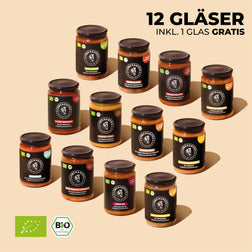Fit through the winter with immune-boosting nutrition
CONTENTS
It's cold outside, inside you're surrounded by people with colds. The immune system therefore works at full speed during these months to keep viruses and bacteria away, prevent infections and maintain health.
Certain lifestyle factors promote immune suppression, including a nutrient-poor and unbalanced diet. In this article we explain which nutrients are particularly important in autumn/winter and which foods should fill the plate every day.
Important nutrients for the immune system
It is well known that vitamin C strengthens the immune system. But there are many more nutrients that the body needs for the immune system. These include the macronutrient protein, omega-3 fatty acids and fiber as well as all micronutrients, which include vitamins, minerals and phytochemicals.
With a balanced diet with lots of fresh fruit and vegetables, nuts, legumes and grains, the body is always optimally supplied. Nevertheless, in the cold months, the focus should be on foods that are at the heart of immune-boosting nutrition. Because the low temperatures, the heated air or pathogens in the air demand more from the immune system than in summer.
The most important vitamins
vitamin C
When it comes to nutrition that strengthens the immune system, vitamins C, A and D come first. Vitamin C supports the immune system in its defense work in that it has an antibacterial effect. It can also inhibit inflammation and inactivate oxygen radicals. Since the vitamin cannot be produced by the body itself and is essential for life, it must be ingested through food. The recommended daily intake is 95 mg for women and 110 mg for men. Smokers should consume at least 135 mg or 155 mg.
Contrary to popular belief, vitamin C is not found exclusively in citrus fruits. In fact, red peppers, blackcurrants and all types of cabbage such as Brussels sprouts, kale or broccoli have even higher levels of vitamin C than oranges or lemons. Just 100 g of a red pepper covers the daily vitamin C requirement.
If you don't have enough vitamin C in the dish, you can refine the meal with parsley or chili; because these also contain large amounts of vitamin C.
Vitamin A
The fat-soluble vitamin A strengthens the immune system because it is responsible for maintaining the skin barrier and mucous membranes. It scavenges free radicals, makes it difficult for bacteria, viruses and pathogens to penetrate and is also involved in the immune system in the intestine.
High levels of vitamin A are only found in animal foods such as pork and beef liver; small amounts in butter, eggs and fish. However, numerous plant-based foods contain ß-carotene, which is converted into vitamin A in the body. This is mainly found in orange and red vegetables (e.g. carrots, sweet potatoes, squash, tomatoes) as well as in spinach, kale, green beans and broccoli.
Here we would like to recommend our recipe for sweet potato toasties with lentils à la Provence . It combines sweet potato with pumpkin, beans, carrots and tomatoes - a real vitamin A (and iron) bomb!

Vitamin D
Vitamin D is the most important vitamin for the immune system because it is involved in essential immune defense processes and protects against respiratory infections. In winter, due to the lack of sun, it is the nutrient that needs the most attention. After all, the body synthesizes vitamin D almost exclusively from sunlight, which is rare in winter, especially in our latitudes. Therefore, it must be ingested through the diet.
Vitamin D is mainly found in animal foods: eggs, fatty fish such as herring and salmon, and dairy products such as cheese and butter. Alternatively, it can also be supplemented; However, it is essential to clarify this with a doctor, since an overdose is very harmful to your health!
The most important trace elements in immune-boosting nutrition
The three most important micronutrients for the immune system are iron, zinc and selenium.
Iron is essential for the expression of the immune response. Too little of the trace element leads to reduced activity of the scavenger cells and reduced formation of lymphocytes and antibodies, which are essential for health.
Iron is mainly found in meat and fish, but is also found in plant foods such as whole grains, spinach, legumes or salsify. For example, one glass each of our organic ready meals Lentils à la Provence , Mountain Lentil Stew or the African Bowl cover a man's entire daily iron requirement!
To increase the availability of iron, iron-rich foods should be consumed together with vitamin C-rich foods.
Zinc has a positive effect on the T-cells, which belong to the lymphocytes and keep infectious agents away. Furthermore, zinc builds up the nasal and pharyngeal mucosa, the formation of which is a prerequisite for the defense against viruses.
The trace element is mainly found in meat, eggs, milk and cheese. It is low in plant foods; these include whole grains, legumes, spirulina, sesame, pumpkin and sunflower seeds, and yeast flakes. Since the Löwenanteil of our dishes consist primarily of legumes , women can cover their entire daily zinc requirement with a glass of chickpea curry , mountain lentil stew or the African Bowl ; in men it is 72%, 72% and 93% per glass.
The trace element selenium is involved in the body's antioxidant protection system, which is why it protects against free radicals and infections. Good sources of selenium are meat, fish, Brazil and coconut nuts, soy and white beans.
Fiber and probiotics for a healthy intestinal flora
If you eat enough fruit, vegetables and whole grain products, you already provide the intestines with a lot of dietary fiber. These are essential for proper digestion and a healthy intestinal flora. But fiber and probiotics, which are contained in fresh sauerkraut, yoghurt, kefir or kimchi, not only keep digestion going: they also protect against diseases, since the majority of the immune system takes place in the intestine. The prerequisite for this is a well-developed intestinal flora with a large number of microorganisms, which can only be achieved by consuming fiber and probiotic foods several times a day.
Dietary fiber is mainly found in whole grains (especially bran), vegetables (especially Jerusalem artichoke, all types of cabbage, potatoes), fruit (especially passion fruit, berries and avocados) and dried fruits, nuts (especially almonds), seeds (linseed and chia seeds) and legumes contain.
Each of the Löwenanteil of organic ready meals covers at least 55% of the daily fiber requirement. In fact, a glass of chickpea curry even covers 100% of the daily fiber requirement. A good reason, our recipe Cooking the fan potatoes with chickpea curry once again.

Fiber also includes prebiotics. These cannot be digested, but are effectively the fodder for probiotics. Good sources of prebiotics are onions, garlic, artichokes, chicory or bananas.
Anti-inflammatory omega-3 fatty acids
Roughly speaking, omega-3 fatty acids are responsible for three areas in the body:
- The central nervous system
- The immune system
- The cardiovascular system
Omega-3 fatty acids strengthen the immune system due to their anti-inflammatory properties. Oils such as flaxseed, camelina, hemp or walnut oil, flaxseed and chia seeds, nuts, soybeans, avocado or fish such as haddock, tuna, mackerel, trout, salmon or sardines should therefore be consumed to meet daily requirements.
3 selected winter superfoods
Winter superfoods include a wide range of foods:
Fruits: apple, pear, berries, pomegranate, kiwi, citrus, avocado
Vegetables : all types of cabbage, leek, pumpkin, cranberries, garlic, onion, chicory & radicchio, carrot, parsnip, sauerkraut, spinach, seaweed
Nuts & Seeds : Cashew, hazelnuts and walnuts, almonds, pistachios, flax and chia seeds, pumpkin and sunflower seeds
Spices : Chili, Ginger, Turmeric, Nutmeg, Parsley, Pepper, Cinnamon, Thyme, Cumin, Rosemary, Cocoa
Ginger
It is not for nothing that ginger shots have become increasingly popular in recent years. In fact, ginger has been an integral part of Chinese medicine for centuries. It is said to relieve headaches and gastrointestinal complaints, can prevent colds and reduce the risk of infections, since the gingerol it contains has anti-inflammatory and antibacterial effects. The tuber also contains some antioxidants, minerals and essential oils that improve the immune system.
Ginger can be used in many different ways. As a spice, it provides a pleasant spiciness, either fresh or powdered, in all dishes, from soups and stews to biscuits, sweets or teas.
Ginger tea is a great way to start the day. Cut a thumb-sized piece into thin slices and place in a cup. Pour hot water over it and let it stand for at least 7 minutes before drinking.
almonds
Almonds: Small in size but big on health! Almonds are an excellent source of healthy fats, protein and fiber, as well as vitamins E, B2 and potassium. They therefore provide almost all the nutrients that the immune system needs in winter - even iron and zinc.
Just over half the almond is made up of monosaturated and polysaturated fats and about a third is protein. In addition, the kernels score with approx. 11% fiber and, last but not least, are also prebiotic, ie they supply the intestinal bacteria and regulate the intestinal flora. A well-developed intestinal flora - as explained above - is the prerequisite for a strong immune system .
Almonds can be eaten in many ways, e.g. on their own as a snack between meals, as a crunchy topping on muesli or stews, or processed further: ground in biscuits and cakes, pureed into almond butter on bread or with dates and last but not least in vegan cheese - there are no limits to the variety here.
barley grass
Barley grass is an all-round talent and a local superfood that combines a large number of different vitamins and minerals like hardly any other food: It contains more calcium, zinc, iron, magnesium and vitamin C than the usual representatives (milk, meat, spinach, broccoli , Orange) as well as all B vitamins in high amounts.
Barley grass supports digestion and intestinal activity, can lower LDL cholesterol, acts against inflammatory processes due to the high content of antioxidants, tightens the skin, prevents aging and thus ensures a strong immune system and all-round well-being.
A teaspoon of barley grass powder per day is all you need to reap the health benefits. Usually this is dissolved in water and drunk. If you don't like the taste, you can also add it to smoothies or stews; the small amount cannot be tasted.
Conclusion & one last point
The right diet is essential in winter to avoid illness and keep the immune system on its toes. If you eat a balanced diet and cook freshly yourself, you shouldn't have any problems staying healthy.
However, one last point should be added here: Drink lots of water or unsweetened herbal teas! Due to the cold and dry air, the body's need for fluids increases to a similar extent as in summer. Dried out mucous membranes and dry skin provide a wonderful breeding ground for viruses, bacteria and germs - and nobody wants that. So make sure you drink enough fluids.
This article was written by our author Lisa. Her greatest passions are nutrition/health, cooking and sports.





